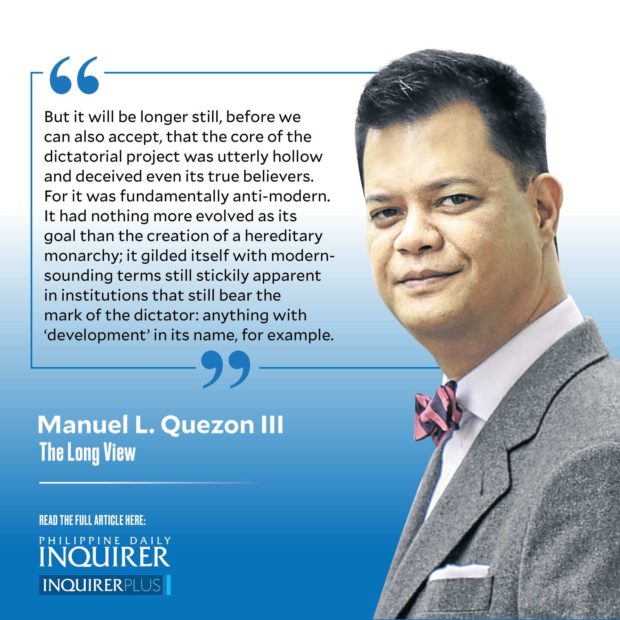Revisiting ML: Means, motive, opportunity (3)
(Last of three parts)In the same manner that those who actually lived through the proclamation of martial law—who, unless they were arrested as Sept. 22 turned into 23, learned martial law had been imposed when Marcos announced it on the night of Sept. 23—got brainwashed by constant government repetition, into believing it was imposed on Sept. 21, when, on that date, the Senate still held sessions and a large protest had taken place in Plaza Miranda!—posterity has come to believe that martial law was essentially accomplished in one night, the night Marcos sent the army to lock up those he feared could organize and lead resistance to his ambitions.
To be sure, he decapitated the political opposition and muzzled the media. But control was still far from absolute, not least because many weren’t convinced absolute control was his. In December 1972, as he announced a plebiscite to approve the constitution he practically wrote himself, gathered in the Palace to applaud the announcement were the Speaker of the House, Cornelio Villareal; the Senate President, Gil Puyat; and, perhaps most surprising of all to our post-martial law eyes, the Vice President, Fernando Lopez. Most of the post-1986 literature assures us the vice presidency was abolished the moment martial law was imposed.
Yet here he was, with then Speaker and then Senate president, as guests by virtue of their rank and position, in the Palace, in December 1972, three months after martial law had been proclaimed. And what they were applauding was the forthcoming abolition of their posts—because they believed they would soon be having new posts to fill. To be sure, Marcos might be doing the unthinkable—not only ruling by force, but ruling by decree—but the majority of the political class and the lawyers could argue it was a temporary measure since Congress was in recess, and a new constitution was forthcoming.
That constitution in the end, would be “approved” by violating the conditions demanded by the one it replaced (a free plebiscite by secret ballot), with the Supreme Court, threatened with abolition if it didn’t say so, announcing it was a done deal no one could do anything about. Only then did Marcos padlock Congress. Which hardly any legislators minded because they expected to be in the new parliament. And only after this January 1973 plebiscite did another take place, in July: allowing Marcos to go beyond his term, which expired in December of that year. It also—surprise!—postponed the convening of the Interim National Assembly or new parliament. In 1975, another plebiscite further postponed the convening of the parliament in which the delegates and legislators had been promised seats. Finally, in 1976, the Interim National Assembly was amended out of existence without ever having been convened, leaving everyone who’d gone along with Marcos’ 1972-1973 schemes without having enjoyed the fruits of their collaboration.
Which, incidentally, is the fundamental reason the “long” martial law has been forgotten, in favor of the idea there was a swift coup nearly instantly successful in its implementation: It conveniently allowed the very, very many, in so many institutions, who collaborated to make the process possible not merely overnight, but over the span of years, to escape being memorialized for their participation in a project that took many years and many stages to actually accomplish.
Those who could, because they did, claim they opposed Marcos before, and during, this long self-coup were very few indeed. And more often than not, bitterly remembered how few they had been. But politics is addition, and as Marcos’ long-term project unraveled in as many years as it had taken him to cobble together his dictatorship, so, too, did the popularity of martial law prove an inconvenient truth for a public being asked to vomit out Marcos (so let’s say that martial law was popular at least among some sectors; for it has also been asserted that Marcos had to pursue the patently unlawful “citizen’s assemblies” by creating the barangay to supplant the existing barrios, because in a genuine plebiscite, the 1973 Constitution would have been rejected by voters) and that defections in the political class was more likely, if that class wasn’t asked to acknowledge it has connived with him; far better, and easier, for born-again liberal democrats to thunder and shrill they’d been terrorized and duped by Marcos, and not in league with him. If the radicals, as scholars like Scalice now argue, could absolve themselves of their initial complicity with Marcos, why, business, academe, the Church, and the politicians could absolve themselves, too. And did.
Which leaves the last confusion that remains. Over time, the realization that national amnesia was inflicted by the Great Dictator when it comes to the actual martial law anniversary has grown (the only real debate left is which is now more truthful and appropriate: Sept. 22, when the first victims were rounded up, or Sept. 23, when the nation found it was now prisoner). Perhaps a starker reckoning of how many more were complicit in the dictatorial project can begin. This also includes accepting that democrats and radicals are equally susceptible to the delusion societies can be refashioned overnight, as rightists.
But it will be longer still, before we can also accept, that the core of the dictatorial project was utterly hollow and deceived even its true believers. For it was fundamentally antimodern. It had nothing more evolved as its goal than the creation of a hereditary monarchy; it gilded itself with modern-sounding terms still stickily apparent in institutions that still bear the mark of the dictator: anything with “development” in its name, for example.
If there can be said to a streak of authoritarianism that manifested itself in the various chapters of our institutional development, then that authoritarianism cleaved at the point of martial law. For what predated it could and did aspire to be modern; but what was attempted in 1972 was not, and could never be.
Email: [email protected]; Twitter: @mlq3
















